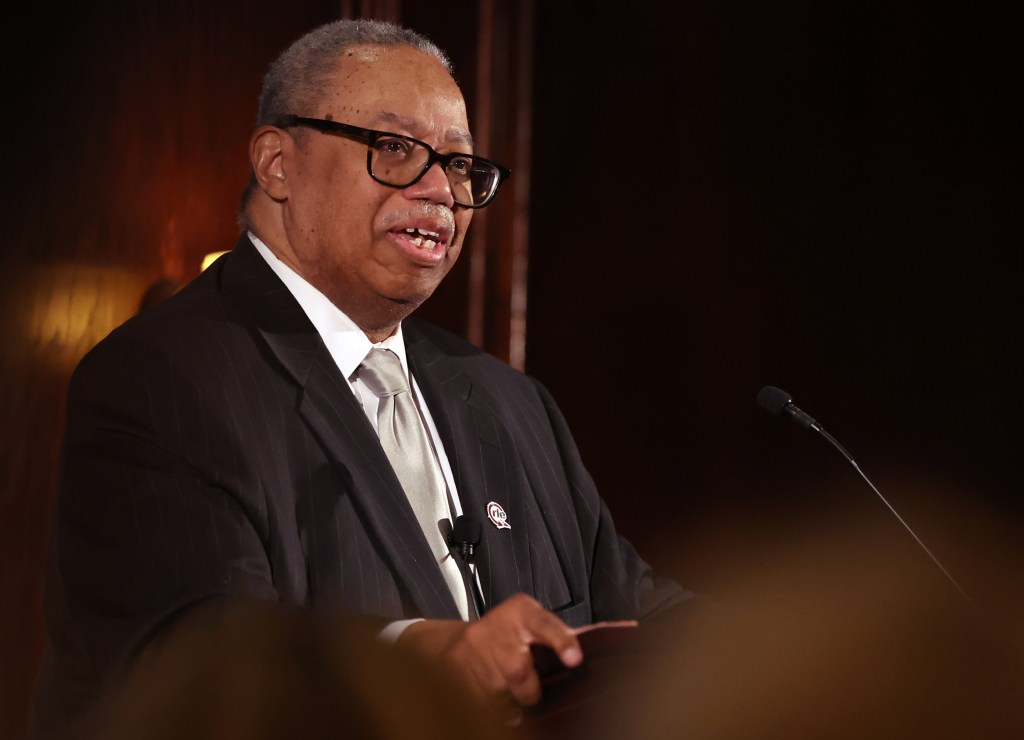CTA Chairman Dorval Carter has laid out an ambitious vision for expanding Chicago’s rail and bus routes — if the state legislature provides the agency with the necessary funding.
It was a bold concept from Carter as political discontent with his leadership has grown, as he outlined Thursday at a luncheon for the city’s business and political elite at the City Club of Chicago. Carter framed it as his attempt to lay out a vision for the future of public transportation, something state lawmakers have been calling for as they grapple with a looming budget cliff once pandemic aid dries up in 2026 and a pending bill to wrest control of the struggling agency from Chicago Mayor Brandon Johnson and consolidate it with the region’s three other transit agencies.
A revamped bus network with eight-minute frequencies on dozens of lines, five- to six-minute wait times between trains at all times, more bus lanes and bus rapid transit systems, new stations and extended rail lines could be Chicago’s, provided the CTA has the support of the Illinois General Assembly, he said.
“These are all visionary ideas that deserve to be discussed and continually advanced, but they must be implemented by a transportation agency that is not discouraged or considered utopian simply because it believes the return on investment is not sufficient.”
Carter declined to specify how much additional funding he would seek from the state for the CTA. Instead, he sought to put the ball in state lawmakers’ court to take action on the future of transit.
“Let’s be clear, what I’ve outlined here is going to be very costly,” he said. “But the question the state Legislature has to face is what kind of commitments are they willing to make to get to where we want to be.”
Even as Carter has laid out an ambitious vision for the future, his transit agency has struggled in recent years to provide frequent, reliable and safe service. He has become the target of critics who have called for his resignation or firing, citing an unacceptable post-pandemic recovery that they say has hampered public transportation in the nation’s third-largest city.
As pressure mounted against Carter and lawmakers considered consolidating the CTA with the region’s other transit agencies, Carter at times pushed back against his criticscriticizing calls for his dismissal as racist and unfair, and seeking to gain favor with key government officialsHis speech Thursday was largely a reiteration of the message he has been pushing in recent months: that the focus should be on how transit is funded rather than how it is managed.
He said the CTA is on the right track in its post-pandemic recovery, but said the funding foundations even before the pandemic were flawed. The CTA provides 84% of the transit service in the region but receives 46% of the funding, he said, arguing that investing in transit would provide a good return for the region as a whole.
Carter highlighted the flaws in a four-decade-old transit funding formula that he called “discriminatory and racially biased” and “amounts to a form of transportation welfare.” He described it as an attempt by politicians in 1983 to sell funding to city and suburban residents, hinting at a modern-day struggle brewing in Springfield over transit governance and funding that is poised to see suburban and city interests compete for influence.
He, however, reiterated his strong opposition to the idea of consolidating the region’s four transport agencies.
“It’s an easy pill to swallow, and it’s a lot cheaper,” he said. “It’s a lot easier to say bureaucracy is the problem, that we need to reorganize some things, than it is to make tough decisions and take tough votes on increasing revenue. It’s a lot easier to present governance as a solution to transit challenges than it is to take a hard look at the policy decisions that have been made in the past.”


